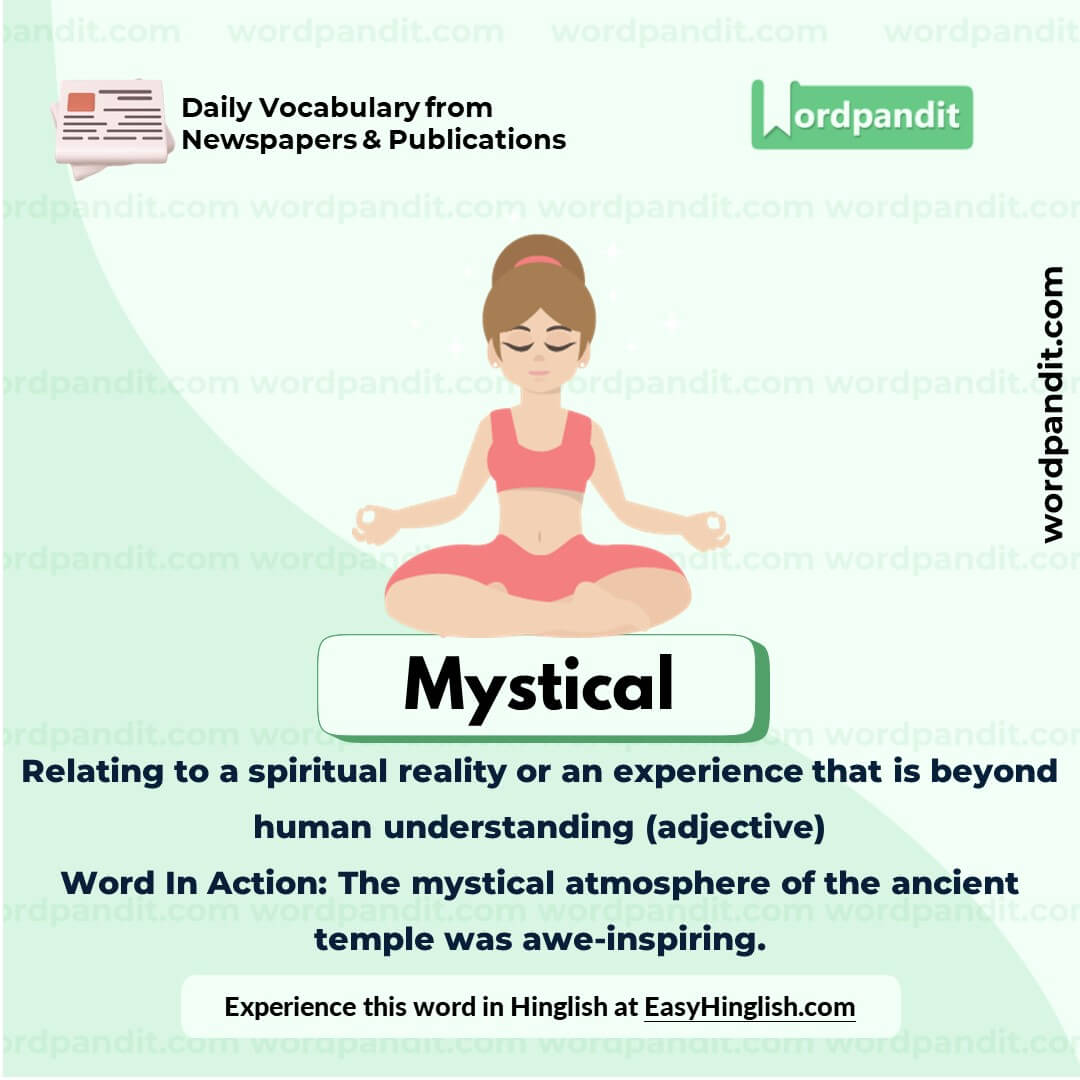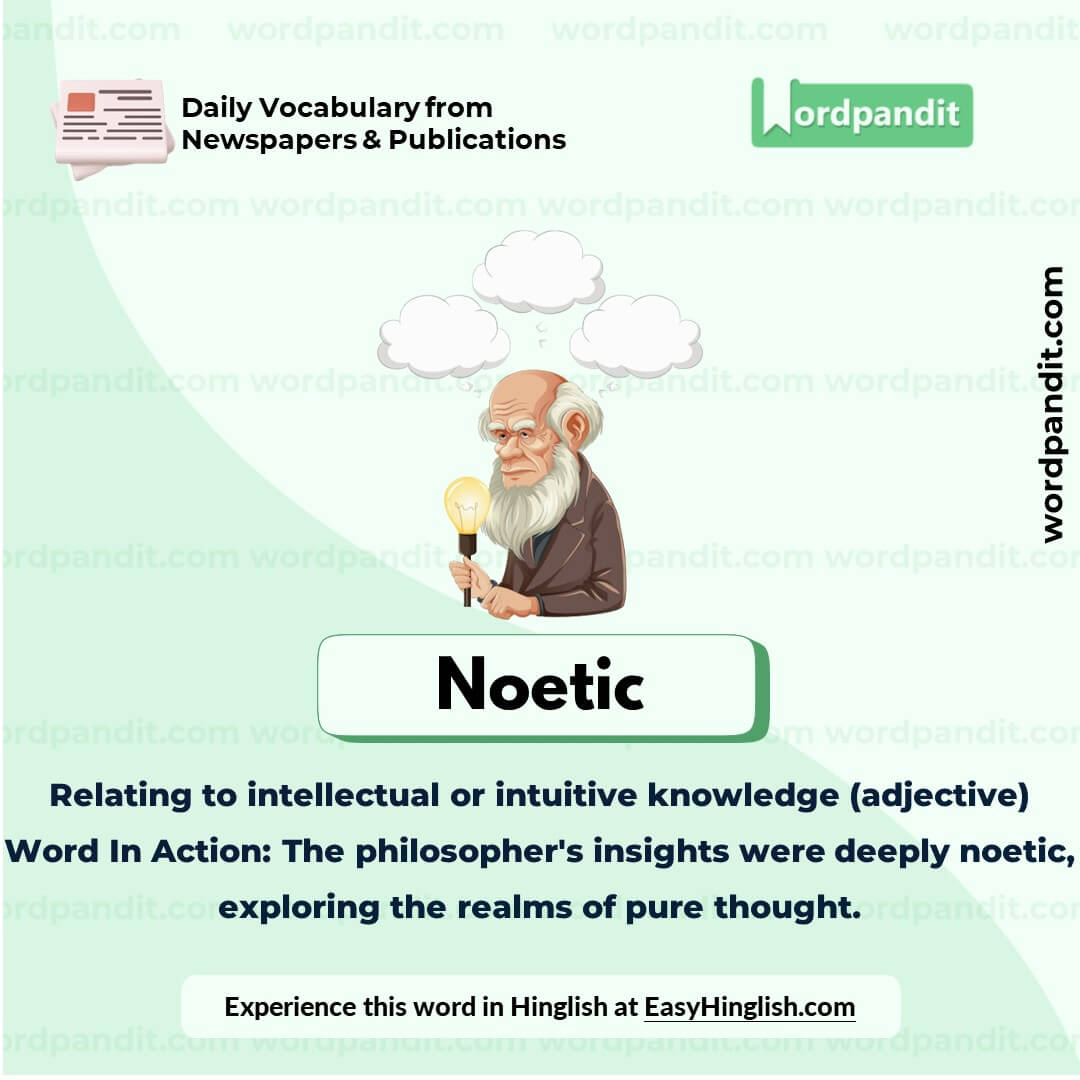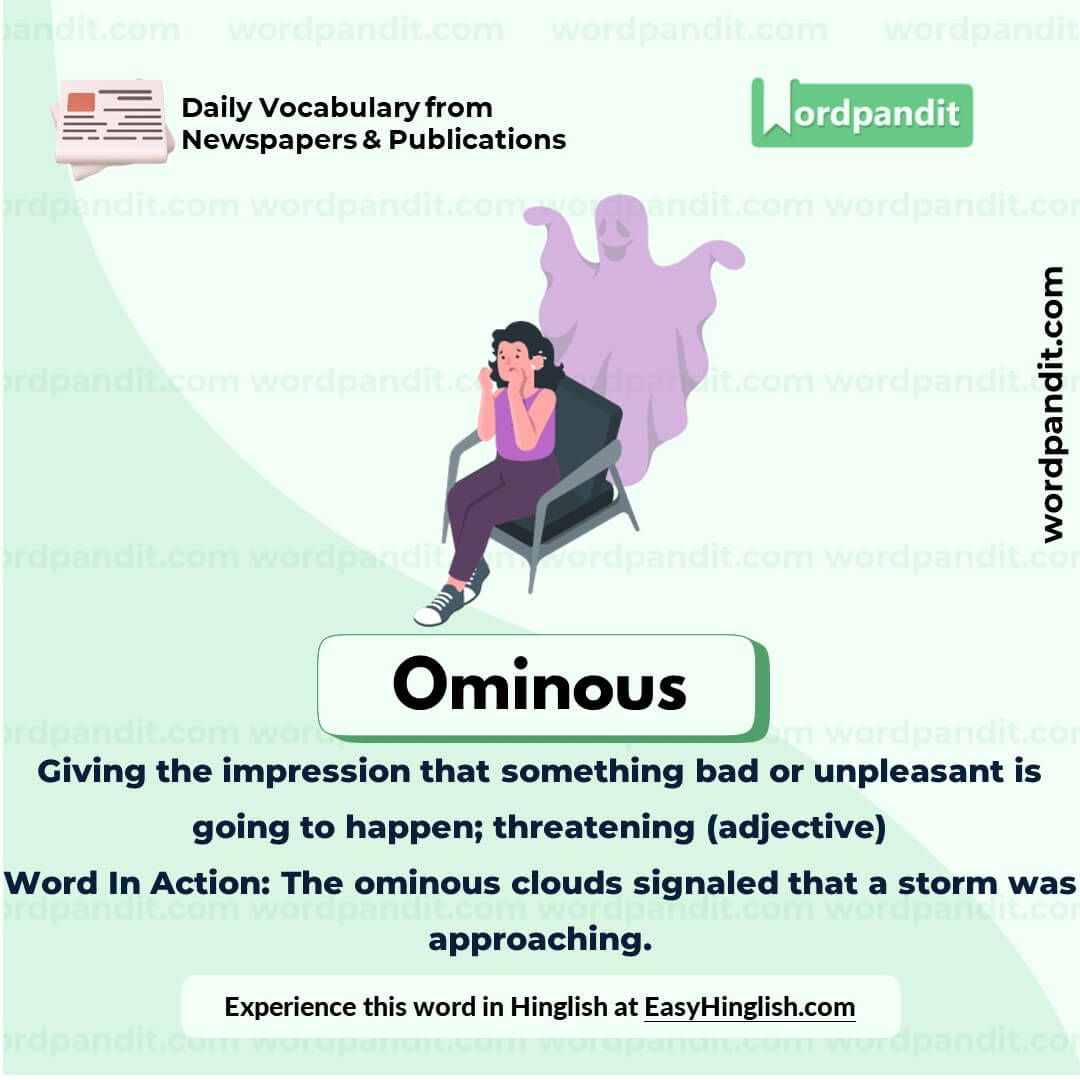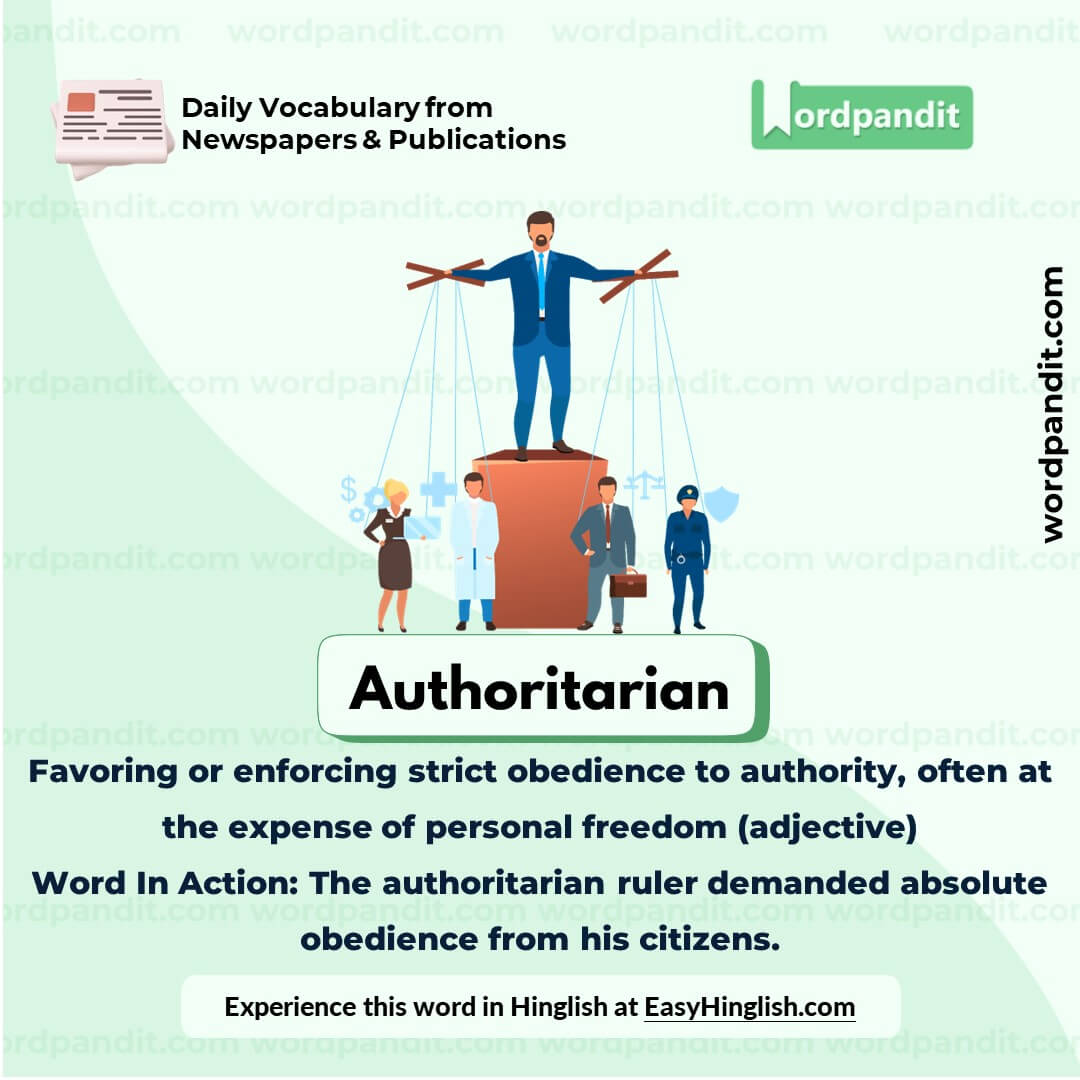Daily Vocabulary from International Newspapers and Publications
Expand Your Vocabulary with Wordpandit’s Global Vocabulary Hub
At Wordpandit, we are committed to helping you develop a truly global vocabulary by drawing from some of the most respected international publications. This section is designed to keep you ahead of the curve by introducing you to words that define global conversations and trends.
The Power of Global Sources
To help you think and communicate on a global scale, we curate vocabulary from renowned international sources, such as:
- The New York Times
- The Washington Post
- BBC
- The Guardian
- The Economist
- Scientific American
- Psychology Today
- And many more...
Stay Global, Stay Competitive
Our daily updates from international publications ensure you are consistently exposed to new words that reflect global news and developments, making sure your vocabulary is not only current but also globally relevant.
Enhance Your Global Perspective
Whether you’re preparing for international exams, aiming to excel in global business communication, or want to enhance your language skills for personal growth, Wordpandit offers the resources you need to thrive in a global context.
Effective Learning, Global Reach
Our learning methodology combines global examples, memory aids, and interactive activities, allowing you to internalize new words effectively and apply them in real-world scenarios.
Begin Your Global Vocabulary Journey Now!
Why Choose Wordpandit?
Practical Learning: Focus on words you'll actually encounter in real-world reading, enhancing your comprehension and communication skills.
Diverse Content: From current affairs to scientific breakthroughs, our varied sources expose you to vocabulary across multiple domains.
Effortless Integration: Make Wordpandit a part of your daily routine. Just a few minutes each day can significantly boost your lexicon over time.
Your Path to Vocabulary Mastery
- Visit our Daily Vocabulary section regularly
- Explore new words and their usage in context
- Practice incorporating these words into your own writing and speech
- Track your progress as your vocabulary expands
Start Your Journey Today
Embark on your vocabulary enhancement journey with Wordpandit. By consistently engaging with our daily posts, you'll build a robust vocabulary that serves you well in academic, professional, and personal contexts.
Remember, a word a day keeps linguistic limitations at bay. Make Wordpandit your daily companion in the quest for vocabulary excellence!
WORD-1: Mystical
Context:
"In his landmark study The Varieties of Religious Experience (1902) William James (1842-1910) attempts to define the common features shared by all mystical experiences, and address whether such experiences justify beliefs based on them." - 1000 Word Philosophy
Explanatory Paragraph:
The word "mystical" refers to something deeply spiritual or mysterious, often associated with transcendent experiences, divine encounters, or profound states of awareness that go beyond ordinary understanding. It is commonly used in religious, philosophical, or esoteric contexts to describe phenomena or insights that feel otherworldly or unexplainable by conventional means.
Meaning: Relating to a spiritual reality or an experience that is beyond human understanding (adjective)
Pronunciation: MIS-ti-kuhl
Difficulty Level: ⭐⭐⭐ Intermediate
Etymology: Derived from the Late Latin mysticus, meaning 'secret or mystical,' and the Greek mystikos, related to initiation into mysteries.
Synonyms & Antonyms:
Synonyms: Spiritual, transcendental, esoteric, enigmatic, otherworldly
Antonyms: Logical, mundane, rational, empirical, ordinary
Usage Examples:
- The poet described the mystical beauty of the moonlit forest in her verses.
- Many ancient texts delve into the mystical aspects of human existence.
- His artwork carries a mystical quality that leaves viewers in awe.
- The mystical experience in the retreat changed her perspective on life forever.
Cultural Reference:
"William James's work 'The Varieties of Religious Experience' is a seminal text exploring the mystical dimension of human spirituality, arguing that such experiences, though subjective, are powerful and transformative." - 1000 Word Philosophy
Think About It:
Why do mystical experiences often transcend cultural and linguistic barriers, and what does this suggest about their universal nature?
Quick Activity:
List three scenarios or settings where you might describe something as "mystical." Share why you chose those examples.
Memory Tip:
Think of "mystical" as "mystery meets magical" to help connect the word to its meaning.
Real-World Application:
The term "mystical" is used in describing art, music, and literature that evoke a sense of mystery and transcendence, as well as in discussions of spiritual practices like meditation and prayer.
WORD-2: Noetic
Context:
"James refers to this characteristic as the 'noetic quality' of mystical experience, i.e., it seems to provide genuine knowledge (i.e., noesis) of 'ultimate' realities (e.g., God, Brahman, etc.) which are perhaps unavailable to ordinary consciousness." - 1000 Word Philosophy
Explanatory Paragraph:
The word "noetic" pertains to intellectual or cognitive processes, often related to deep, intuitive understanding or insights. In philosophy, it describes experiences or phenomena that seem to convey profound knowledge or awareness, particularly about ultimate or metaphysical realities. It is closely associated with the mind's capacity for higher reasoning and enlightenment.
Meaning: Relating to intellectual or intuitive knowledge (adjective)
Pronunciation: NOH-et-ik
Difficulty Level: ⭐⭐⭐⭐ Advanced
Etymology: From the Greek word noetikos, meaning 'of or pertaining to the mind,' derived from noesis, meaning 'intellect or understanding.'
Synonyms & Antonyms:
Synonyms: Intellectual, cognitive, intuitive, perceptive, insightful
Antonyms: Physical, sensory, superficial, empirical
Usage Examples:
- The philosopher's noetic insights into existence reshaped the way her students viewed the world.
- Many spiritual practices aim to trigger a noetic experience that transcends rational thought.
- During the lecture, he described the noetic nature of mathematical truths.
- Her writing has a noetic depth that invites readers to explore profound truths.
Cultural Reference:
"In William James's study of religious experiences, he defines the noetic quality as an integral aspect of mystical experiences, emphasizing their ability to impart profound, almost ineffable knowledge." - 1000 Word Philosophy
Think About It:
Can knowledge obtained through noetic experiences be considered as valid and reliable as knowledge obtained through empirical observation or logical reasoning?
Quick Activity:
Write down a situation where you felt you gained a deep insight or understanding about life. Reflect on whether it could be described as a noetic experience.
Memory Tip:
Associate "noetic" with "know" to remember it relates to knowledge and intellect.
Real-World Application:
The concept of noetic experiences is often discussed in the context of meditation, philosophy, and the study of consciousness, where individuals seek profound insights about existence and reality.
WORD-3: Ominous
Context:
"In what appeared to be an ominous threat against Ukraine’s western allies, Mr. Putin also asserted that Russia had the right to strike the military facilities of countries 'that allow their weapons to be used against our facilities.'" - New York Times
Explanatory Paragraph:
The word "ominous" describes something that suggests danger, trouble, or a negative outcome. It often refers to signs or actions that foretell harm or misfortune. The term is commonly used to create a sense of unease or forewarning in both literal and figurative contexts.
Meaning: Giving the impression that something bad or unpleasant is going to happen; threatening (adjective)
Pronunciation: AH-muh-nuhs
Difficulty Level: ⭐⭐ Beginner
Etymology: Derived from the Latin word ominōsus, meaning 'full of foreboding,' from omen, meaning 'sign or portent.'
Synonyms & Antonyms:
Synonyms: Threatening, foreboding, sinister, menacing, baleful
Antonyms: Hopeful, promising, auspicious, reassuring, benign
Usage Examples:
- The dark clouds gathering on the horizon were an ominous sign of the approaching storm.
- The silence in the room felt ominous, as though something terrible was about to happen.
- The politician’s ominous speech hinted at drastic changes to come.
- The sudden drop in temperature had an ominous quality, warning of an impending blizzard.
Cultural Reference:
"In Shakespeare's 'Macbeth,' the appearance of the witches and their cryptic prophecies create an ominous atmosphere that sets the tone for the tragedy that follows."
Think About It:
Why do humans often associate specific signs or events with ominous meanings, and how does this influence decision-making?
Quick Activity:
Describe an event or situation in your life that felt ominous at first but turned out to have a positive outcome. Reflect on how your perception changed.
Memory Tip:
Remember "ominous" by associating it with "omen," a sign that something negative might happen.
Real-World Application:
"Ominous" is frequently used in journalism and storytelling to create a sense of tension or forewarning, helping readers anticipate possible consequences or dangers.
WORD-4: Fending
Context:
"Today, our Constitution’s pluralist, progressive, and peaceful idea of India faces numerous perils, as do the institutions and watchdogs entrusted with safeguarding it and fending against authoritarian impulses and brute majoritarianism. But there is no reason to lose hope." - BBC
Explanatory Paragraph:
"Fending" refers to the act of defending or protecting oneself, others, or something valuable against harm or attack. It can also mean dealing with or coping with challenges or difficulties. The term suggests active effort to ward off threats or manage adverse situations.
Meaning: Protecting or defending against a challenge, threat, or attack; coping with a difficult situation (verb)
Pronunciation: FEND-ing
Difficulty Level: ⭐⭐ Beginner
Etymology: Originates from the Old English word fendan, meaning 'to defend,' which is derived from the Latin root fendere, meaning 'to strike or ward off.'
Synonyms & Antonyms:
Synonyms: Defending, protecting, shielding, guarding, coping
Antonyms: Surrendering, yielding, neglecting, abandoning
Usage Examples:
- The knight was tasked with fending off attackers from the castle walls.
- She has been fending for herself since moving to the city, building a career from scratch.
- Vaccines play a crucial role in fending against contagious diseases.
- The team is focused on fending off competition while maintaining their lead in the market.
Cultural Reference:
"The concept of 'fending for oneself' has been a recurring theme in literature, such as in Charles Dickens's novels, where characters often struggle to survive and defend their dignity against harsh societal conditions."
Think About It:
How does the act of fending against challenges shape an individual’s character or identity over time?
Quick Activity:
List three personal or historical examples of situations where people had to fend against significant challenges. Reflect on the outcomes.
Memory Tip:
To remember "fending," think of "fence," which acts as a protective barrier, just like fending protects against threats.
Real-World Application:
The word "fending" is used in various contexts, from personal struggles and self-reliance to larger-scale efforts, such as nations defending against external threats or societal issues.
WORD-5: Authoritarian
Context:
"Today, our Constitution’s pluralist, progressive, and peaceful idea of India faces numerous perils, as do the institutions and watchdogs entrusted with safeguarding it and fending against authoritarian impulses and brute majoritarianism. But there is no reason to lose hope." - BBC
Explanatory Paragraph:
The word "authoritarian" describes a system, government, or individual that prioritizes strict obedience to authority at the expense of personal freedoms. It often implies a concentration of power in a leader or group that suppresses dissent and enforces control, frequently through coercion or oppressive measures.
Meaning: Favoring or enforcing strict obedience to authority, often at the expense of personal freedom (adjective)
Pronunciation: aw-thor-i-TAIR-ee-uhn
Difficulty Level: ⭐⭐⭐ Intermediate
Etymology: Derived from the Latin word auctoritas, meaning 'authority,' it evolved in the mid-19th century to describe centralized, undemocratic power.
Synonyms & Antonyms:
Synonyms: Autocratic, dictatorial, oppressive, totalitarian, tyrannical
Antonyms: Democratic, egalitarian, permissive, lenient, libertarian
Usage Examples:
- The authoritarian regime curtailed press freedoms and silenced political opponents.
- Critics argue that an authoritarian leadership style stifles creativity and innovation.
- Citizens protested against the government’s authoritarian policies that restricted civil liberties.
- In the novel, the protagonist rebels against the authoritarian control of the ruling elite.
Cultural Reference:
"George Orwell’s novel '1984' is a classic depiction of an authoritarian society where personal freedoms are nonexistent, and the state exercises total control over individuals." - Literary Canon
Think About It:
What are the potential risks and benefits of an authoritarian system of governance, and how do they compare to democratic systems?
Quick Activity:
Research one historical or current example of an authoritarian government. Identify three characteristics that define its rule.
Memory Tip:
Connect "authoritarian" with "authority taken too far" to recall its association with strict and oppressive control.
Real-World Application:
The term "authoritarian" is widely used in political discussions to critique governments or leaders who prioritize control and obedience over freedom and equality, making it a crucial concept in civics and governance studies.
















